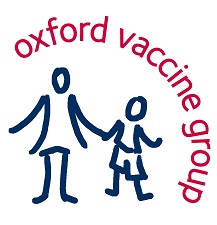Oxford Vaccine Group
 | |
| Sponsored by | Bill & Melinda Gates Foundation |
The Oxford Vaccine Group (OVG) is a vaccine research group within the Department of Paediatrics at the University of Oxford.
OVG was founded in 1994 at the John Radcliffe Hospital and moved in 2003 to its current location in the Centre for Clinical Vaccinology and Tropical Medicine (CCVTM) at the Churchill Hospital in Oxford, England.[1]
Contents
Director of OVG
In 2001 Professor Andrew Pollard was appointed Director of OVG, which comprises around 75 members across a number of disciplines, including consultants in paediatrics and vaccinology, clinical research fellows, research nurses, statisticians, post-doctoral laboratory scientists, research assistants and DPhil students.
OVG’s Director, Professor Pollard, is Senior Advisor to the Medicines and Healthcare Products Regulatory Agency (MHRA) Panel, advises the European Medicine Agency (EMA) and chairs the Joint Committee on Vaccination and Immunisation (JCVI).[2]
Oxford vaccine trial
On 24 April 2020, Oxford scientists announced that studies on macaque monkeys had proved OVG's COVID-19 vaccine effective, and began trialing in around 1,110 human volunteers, half receiving the ChAdOx1 nCoV-19 vaccine and the other half (the control group) receiving a widely available meningitis vaccine.[3] However, within a month, one academic called for an “urgent re-appraisal of the ongoing human trials” of the vaccine.[4]
Harvard doubts
On 16 May 2020 William A. Haseltine, former professor at Harvard Medical School and Harvard School of Public Health, raised doubts about the effectiveness of the OVG vaccine, telling Forbes magazine:
"The day after data appeared from the vaccine maker Sinovac showed complete protection of rhesus monkeys by their vaccine candidate (whole inactivated SARS-CoV-2 virus particles), scientists from the Jenner Institute in Oxford issued a press release announcing that their vaccine (an adenovirus vector based vaccine that carried the SARS-CoV-2 spike protein) worked to protect rhesus monkeys and that they were moving forward with large scale human safety trials. At the time, the substantiating data was not available. Now it is, in the form of a May 13 BioRxiv preprint.
"What to make of this data? It is crystal clear that the vaccine did not provide sterilising immunity to the virus challenge, the gold standard for any vaccine. It may provide partial protection. The question then becomes: Will partial protection be enough to control the COVID-19 pandemic? That is an open question.
"We know what the public response is of the Oxford Vaccine Group and their collaborators. Proceed with full speed to human safety then efficacy trials. Time will tell if this is the best approach. I wouldn’t bet on it."[5]
Funding
In 2016, the Bill and Melinda Gates Foundation gave a consortium including the Oxford Vaccine Group a grant of more than $36.9 million (£29.8 million) to work on the introduction of, and access to, new and more effective typhoid vaccines. [6]
Sponsor
| Event | Description |
|---|---|
| Bill & Melinda Gates Foundation | Very influential and rich foundation established to take leadership of global health. |
References
- ↑ "Oxford Vaccine Group website"
- ↑ "Joint Committee on Vaccination and Immunisation membership"
- ↑ "Oxford COVID-19 vaccine begins human trial stage"
- ↑ "Experts raise doubts about Oxford University vaccine after it fails to stop Covid-19 in animal trials"
- ↑ "Did The Oxford Covid Vaccine Work In Monkeys? Not Really"
- ↑ "International consortium, including OVG, receives $36.9 million grant to fight Typhoid"
Wikipedia is not affiliated with Wikispooks. Original page source here